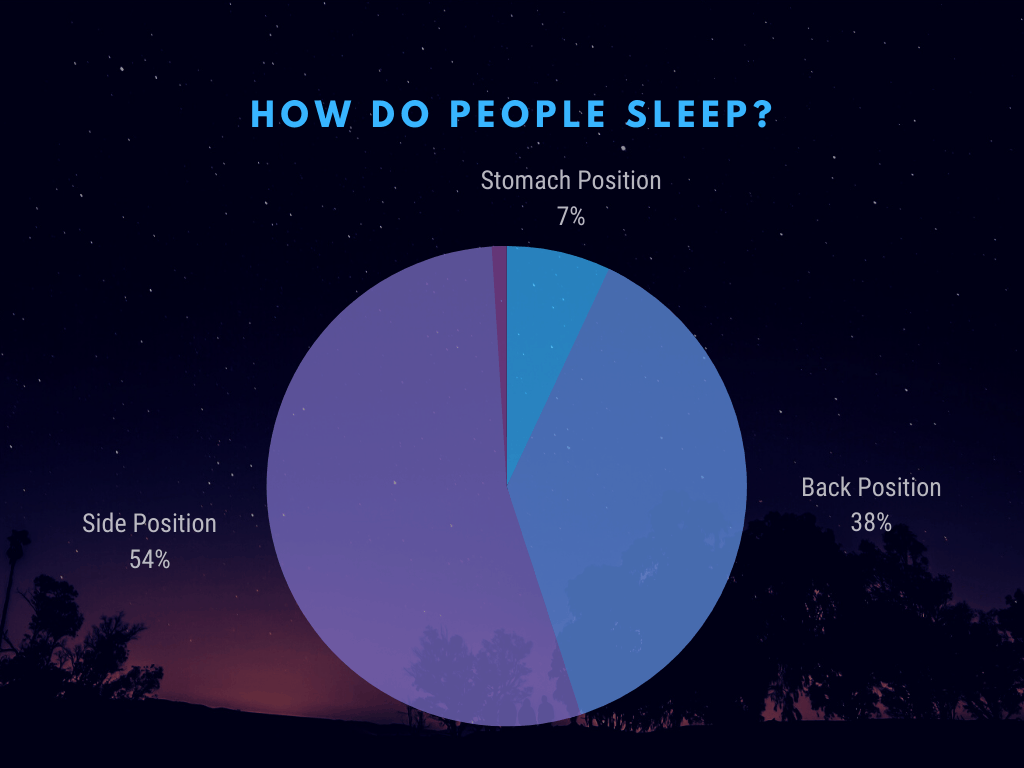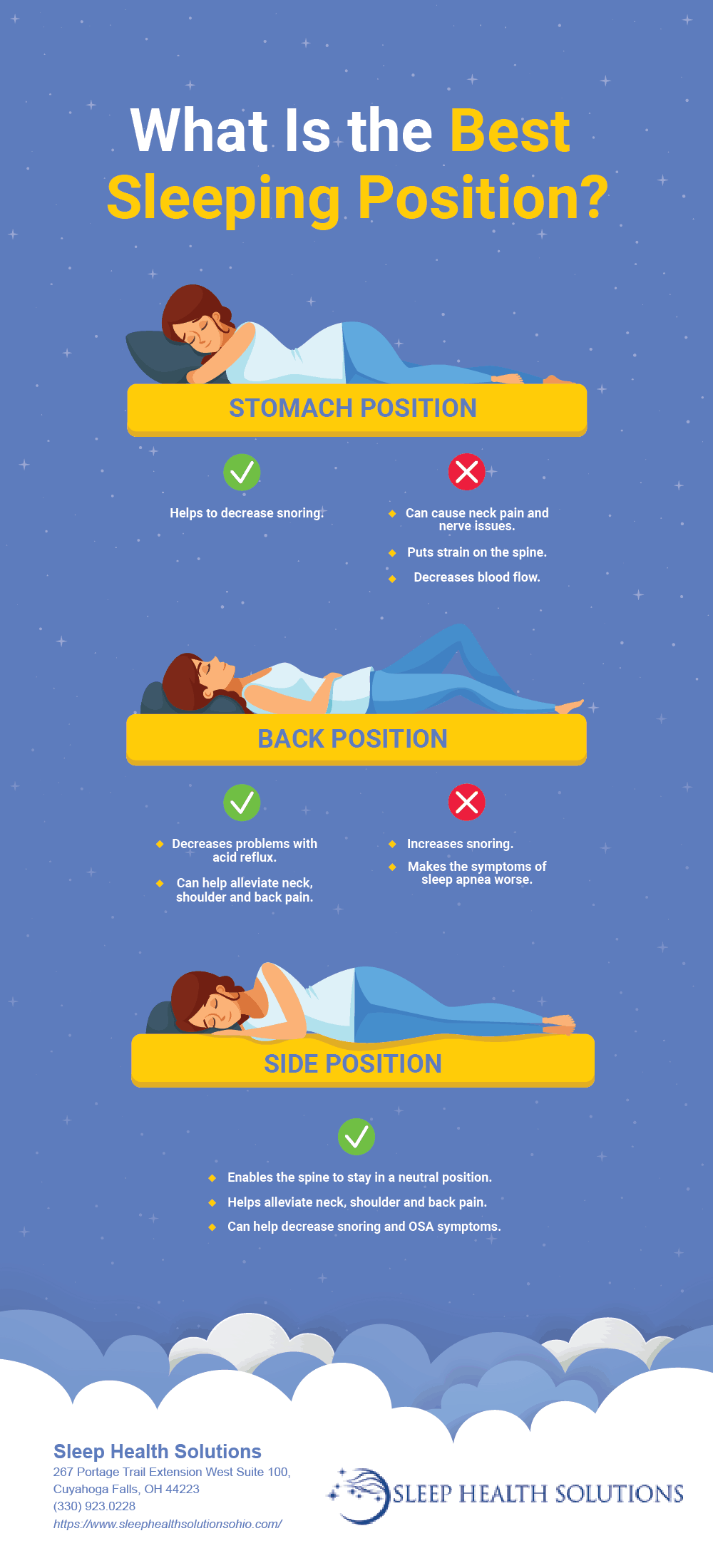How Sleeping Position Affects Your Health
Most adults settle into bed without giving a second thought to how they are situated. It is such a routine habit that many do not consider the health effects of sleeping one way or another. Yet, sleep researchers and doctors say that our sleeping position matters.
Sleeping on your stomach, back or side can make a difference in terms of snoring, symptoms of sleep apnea, neck and back pain, and other medical conditions. Find out what the best sleep position is for your health.
What Is the Most Common Sleep Position?
The majority of people sleep on their side or back and the smallest percentage of people sleep in a stomach position.
Check out this chart to see the most common sleep positions. Source: Nature & Science of Sleep.
What Is the Best Sleep Position?
It is not news that sleep is important to health in many ways. But you may be surprised to find out that the way you sleep at night may have an impact on sleep quality and other health conditions. So, what is the best body position for sleeping?
Worst: Sleeping on Your Stomach
If you like to sleep face down, you are not alone, but you are in the minority. About 7% of adults sleep on their stomach, or in the prone position. It may help decrease the sound of snoring, but in general, stomach sleeping is not recommended.
With your head raised on the pillow, it can be difficult to keep the spine in a neutral position. Sleeping on your stomach puts a strain on the back and neck. With the middle of your body being the heaviest part, it causes the spine to overarch. With time this can lead to pain and nerve issues. You may notice numbness or a tingling sensation in the extremities. Additionally, turning the head to one side while lying down can limit blood circulation and reduce the size of the airway.
If you find it difficult to change your sleeping position, try to modify it. Keep the neck straight and prop only the forehead on the bottom edge of the pillow. In this way, the spine will be in a more neutral position while allowing room to breathe freely. You can also try elevating the pelvis with a thin pillow to help alleviate the pressure on the lower back.
Bad: Sleeping in the Fetal Position
It is important to note that the fetal position is not recommended, however. Though the body is situated on the side, the extreme curvature of the spine can cause strain and discomfort in the neck and back. Being tightly curled while sleeping can also limit space for the diaphragm and restrict breathing.
Better: Sleeping on Your Back
The supine position is the second most common sleeping position. Sleeping with your back flat on the bed enables the spine to stay in a more natural position. This prevents some of the neck, shoulder and back pain experienced with other postures. By elevating the head with a pillow, it can also be helpful in reducing problems associated with acid reflux.
However, this position exacerbates snoring and obstructive sleep apnea. This is because as the tongue and soft tissues in the throat relax, gravity will pull them down into the airway. If you have been diagnosed with this sleep disorder, you should talk to your clinician about how to best modify your sleeping habits.
If you enjoy sleeping on your back but notice that it leads to lower back pain, try modifying the position. Use a low pillow or cervical cushion to support the neck and a medium-sized pillow or large neck roll for propping up the knees. This will help reduce discomfort and strain on the lower back.
Best: Sleeping on Your Side
The majority of people find this sleeping position to be the most comfortable, and for good reason. The lateral posture is recommended by physicians and sleep specialists because it has a number of benefits. With the right mattress, the spine can remain elongated and relatively neutral while on your side. This helps prevent undue neck, back, and shoulder pain.
We made this handy visual chart to clarify the advantages and disadvantages of the three main sleeping positions: stomach, back, and side.
Anyone who struggles with loud snoring or sleep apnea is advised to sleep on their side because the airway is less likely to become restricted even when the body is relaxed. Studies have shown that it can decrease the number of apneas at night and provide better quality, more restful sleep. The lateral position is also recommended for people with arthritis, acid reflux, neck and back problems. For women who are pregnant, sleeping on the left side of the body is best, especially in the second and third trimesters. This is due to enhanced blood flow to the placenta and improved kidney function, which helps decrease swelling in the mother’s legs and feet.
Side sleeping is best when the chest and legs are kept relatively straight, with the spine in an elongated, yet natural alignment. You should use a firm, medium-height pillow or ergonomic cushion to support the head and neck. To ease pressure on the lower back, you may be more comfortable with a pillow between your legs. This provides more support for the hips, pelvis and the lower back.
Get helpful tips for Finding the Best Mattress for Quality Sleep.
Are You Struggling to Get a Good Night’s Sleep?
If you are feeling the effects of sleep deprivation or worry that you may have a sleep disorder, request a referral from your physician. Sleep Health Solutions can get you set up for sleep testing in-home or at our specialized overnight clinic. Our professional team can provide the information that your doctor needs to form a diagnosis and develop a treatment plan.
Call our sleep clinic today at (330) 923-0228 to schedule a consultation.



